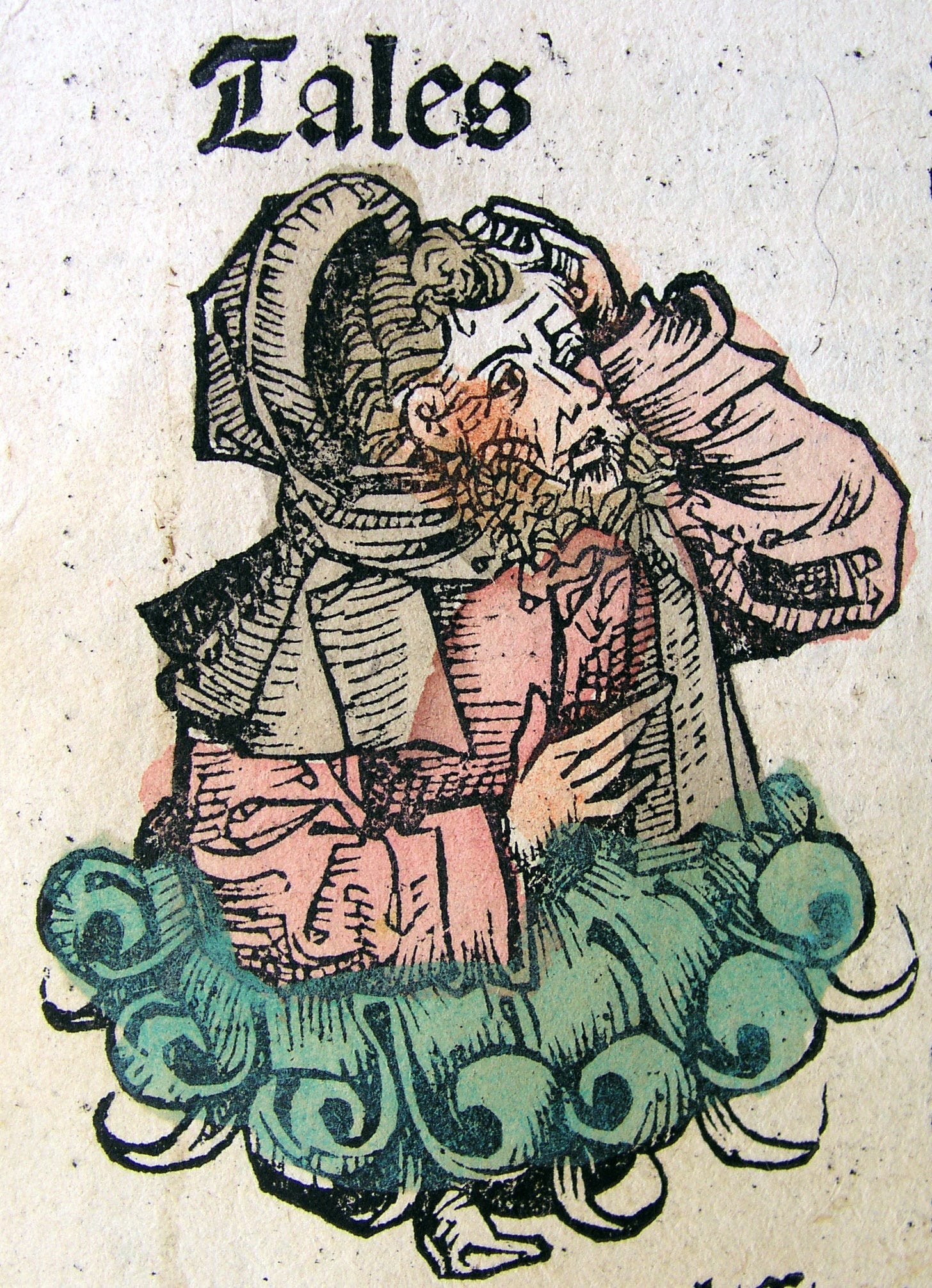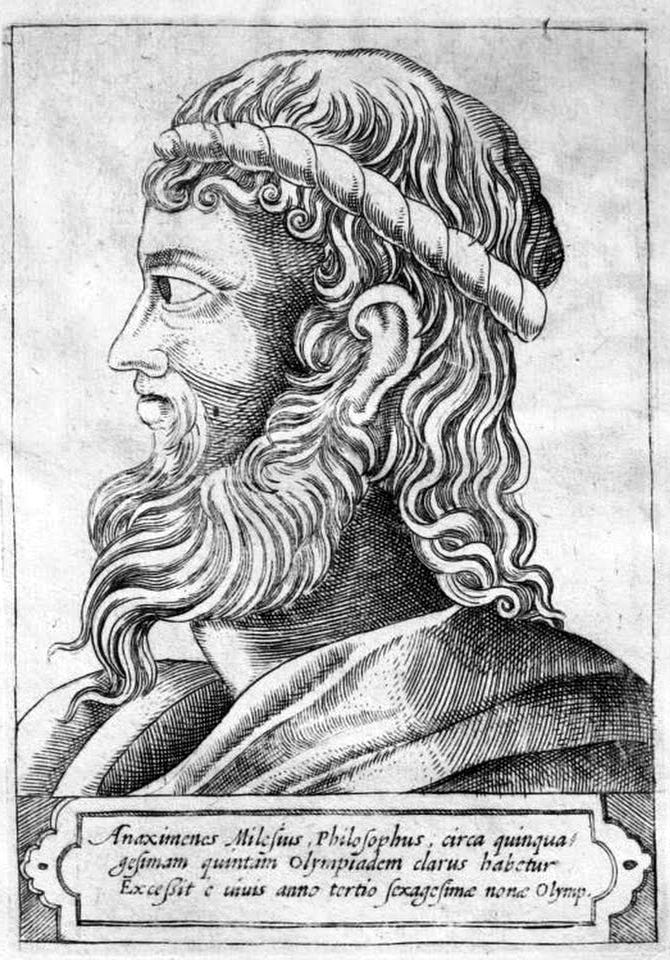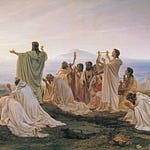Welcome to the journey.
The seventh century B.C. was an exciting time.
It was a period of great empires, such as Lydia and Babylonia in the Orient, and Egypt in Northern Africa.
The Zhou dynasty in China was still going strong and was about to give birth to the great philosophers Confucius and Laozi.
Rome was still a small but developing city-state, unaware of the powerhouse it would become centuries later. And in the Orient, one of the mightiest empires was about to emerge: the Achaemenid (or Persian) empire.
We’re focusing on ancient Greece, though. You know, the Homeland of the most good-looking, smart, wise, civilized people on Earth: the Hellenics. At least, that’s how they saw themselves. Nonetheless, they were pretty great, in many aspects.
The seventh century B.C. wasn’t long after Greece experienced a revival after a long dark age.
In terms of progress, many great things have happened since then. The Greeks adopted coinage from the East, recovered literacy using a new writing system based on their Phoenician neighbors, and city-states (also known as poleis) were being formed.
At the end of the 7th century, something big was about to happen in ancient Greece; something that would change the way people thought. It would form the basis of Western philosophy and modern science.
This big thing, this revolution of thought, started in the bustling coastal city of Miletus, where, in succession, three presocratic philosophers arose: Thales, Anaximander and Anaximenes.
***
This is Journey of Ideas, my name is Stefan, also known as Einzelgänger. This is not an AI voice. I’m a real person. And I’m taking you on a long trip.
We’re exploring the ideas of the many great thinkers of history, as well as the times and places in which they lived. Right now, we’re at the very beginning of Western philosophy.
This episode is available as an audio podcast on Spotify, Substack, Apple and several other platforms, and as a full visual version with lovely background music on the Einzelgänger YouTube channel. To stay updated about all of my content, subscribe to my newsletter on Substack or on the website journeyofideas.com.
I hope you’ll enjoy the episode.
***
We hung out in Miletus for a little while, at least, in a reconstruction of it, in the first episode. We caught a glimpse of how people lived and what life must have been like, what the city must have looked like, even though there’s hardly anything left of archaic Miletus before it was destroyed by the Persians.
We saw a society full of myth and ritual, in which the gods were deeply intertwined with daily life. We saw Greek religion in the form of mythology, shrines, temples, rituals; all of which functioned as social cement for the ancient Milesians and the rest of the Greek civilization. There was order, sustained by stories and belief. But this order would soon be challenged.
Ionia was a breeding ground of freethinkers. There must have been an atmosphere that allowed for those who challenged the conventional system of Homeric gods.
These freethinkers weren’t satisfied with explaining natural phenomena by simply pointing to the gods. People at that time would say, for example, that earthquakes are caused by Poseidon, god of the sea. Or that the supreme god Zeus causes lightning and lives in his palace on Mount Olympus. But what if these beliefs were, you know, ‘just beliefs’?
Let’s go back to Miletus for a brief moment.
Remember walking through the streets smelling of freshly baked bread, then past the temples and shrines, seeing the Milesians pray and honor the gods as if their lives depended on it? That’s where we are.
Now imagine a young man walking around in this environment, looking at his fellow religious citizens with suspicion. He was sceptical. He doubted what most people at the time took for granted.
He must have been full of questions. “Are these gods people worship truly powerful? Is there any proof they exist? Or are they merely inventions, created to explain the unexplainable?”
Standing on the peninsula, he must have watched the sunset, the fishing boats drifting by, and islands fading into the horizon, and thought: “What is this all about? How does this all happen? And why?”
We may never know exactly what this sceptical Milesian thought, but we do know that he tried to figure out how the universe works, independent of mythology. That was pretty radical! I mean… doubting the status quo was one thing; trying to uncover the true workings of nature was another. But he gave it a shot in a way no one else before him did. And that’s why he’s seen as the first philosopher of the Western tradition.
His name was Thales of Miletus, born in the late 7th century BC. Thales is the first reason why we started our journey in this city. In this episode, we’ll talk about Thales and his ideas, but also about two other philosophers from Miletus who came after Thales: Anaximander and Anaximenes.
This philosophical trio shared a common goal. All three of them accepted a certain idea about our world, or actually, about the universe in general. By the way, the Greeks back then didn’t speak of the universe but of the “cosmos” which means the world seen as an ordered whole. It has a slightly different definition. But for simplicity’s sake, let’s stick with “universe”.
Thales, Anaximander and Anaximenes believed that the Earth and, therefore the universe as far as they had a concept of it, had started from something: some fundamental force. They called this source of everything “arche,” which we could loosely translate as “first principle”.
As it’s a first principle, the arche must have been something big, something so overarching and great, that everything could be derived from it. And with everything I mean everything: the trees, the oceans, the mountains, people, animals, your noisy neighbor and so forth.
The arche had to be credible (at least, for that period). It had to be rationally sound and consistent with what we can observe in nature, instead of being based on the ancient Greek version of… “trust me bro”. So, appealing to the conventional gods was not sufficient. Saying that Poseidon was the cause of earthquakes or Zeus the cause of lightning, was inadequate.
Even though Thales, Anaximander and Anaximenes agreed on a first principle underlying everything, they didn’t agree on what it actually was. All three of them had their own unique theories.
Their theories are pretty interesting. Sure, most of it is clearly not correct. But it’s important to remember that they were pioneers. And their efforts profoundly influenced the course of human thinking in the West. And therefore, they deserve our attention.
Thales & water
Thales of Miletus is regarded as the first philosopher; not just by modern scholars, but by one of the heavyweights, one of the OGs of western philosophy: Aristotle.
Yet, Thales’ contribution to philosophy and science remains controversial, for the simple reason that this man is pretty much a puzzle.
If we were to believe all the stories attributed to him, he comes across as a Wunderkind: someone who possessed immense intelligence and knowledge, and who did things almost too great to be true. It would be ironic to say he performed miracles (as he wanted to explain nature by way of, well, nature) yet reading some accounts it almost feels like he did.
I think we could safely say that Thales was a curious man, eager to explore the world and what lies beyond it.
Once, as it’s told, Thales was watching the stars. As he was so immersed in observing the mysteries of the sky, he fell into a well. A witty and charming maid saw what happened and made fun of him, and I quote Socrates: “Saying that he was crazy to know about what was up in the heavens while he could not see what was in front of him beneath his feet.”
Thales is said to have calculated the timings of solstices and equinoxes. And one of the most noteworthy accomplishments attributed to him was the prediction of a solar eclipse during a battle between the Medes and Lydians. However, many scholars reject this because, with the knowledge of that time, doing such a precise prediction was very unlikely.
Thales also contributed to mathematics, and is considered by many the first mathematician in the West, as he introduced geometry to Greece. There’s even a story about Thales assisting king Croesus’ military endeavors, during which he helped his army cross a river by digging a diversion to reduce the waterflow.
Yet, stories like these remain doubtful.
And another challenge with Thales is that he didn’t write anything down. At least, he might have, but none of it survived in any substantial way. Luckily, many wrote about him. No less than historian Herodotus, the heavyweight philosopher Aristotle and the well-known biographer Diogenes Laertius mentioned him.
From what I’ve read about him, I’d say that his most important contribution to philosophy is his theory about arche. See, Thales believed that all originated from something; a single substance everything is made of. And to him, it was clear that the arche was water.
We don’t know exactly what led Thales to believe that water is the first principle. But I think it’s pretty easy to construct a rationale, simply by observing the world around us.
We could start by looking at ourselves: humans are roughly 60% water. All living beings need water to survive; plants need water to grow, humans and animals need to drink water, fish need to be surrounded by water. It seems clear as day that water is one of the most significant building blocks of life; everything alive has a moist nature. Thales noticed specifically that seeds (the basis of so many organisms) are generally moist.
For Thales, as a Greek, water was everywhere. The ocean was never far away. And the Greeks were a seafaring civilization. Other continents were mostly a mystery, but it seemed that all land masses were surrounded by water. And it surely wouldn’t have escaped Thales that water is so prominent that it even falls from the sky. He went as far as to declare that the Earth was floating on a giant primordial ocean! And this ocean was endlessly deep.
If we go along with the idea that water is where everything comes from and returns to, the idea that our world is surrounded by vast amounts of it, makes sense. Consistent with this idea, Thales believed that earthquakes were not caused by the god Poseidon, but by fluctuations in the oceans the Earth is resting on.
Even though Thales was wrong, his speculation was nonetheless much closer to what we’d call “scientific” than the myth of Poseidon. So, here we see this first philosopher ‘ditching’ a conventional human-like god and replacing it with a theory of nature, based on observation, rational explanations, arguments and logic. It was a shift from mythos to logos.
Apparently, Thales’ endeavors met with mockery from his surroundings.
His curiosity about the world… Well, to many of his fellow Milesians, it must have seemed useless. What good was staring at the stars when real life demanded hard work, feeding your family, and earning a living? Shouldn’t a real man do some real man’s work?
According to some versions of the story, Thales was pretty annoyed by the comments of his fellow citizens, and became determined to prove himself. So, what did he do? He used his knowledge of the stars to predict a good crop of olives. He then hired all the olive presses in Miletus and neighbouring island Chios.
So, when the olive harvest came, demand skyrocketed, and he could rent them out at any price he wanted. He made a lot of money. And most importantly: he proved that he, as a philosopher, could get rich if he wanted to. But getting rich wasn’t his goal in life, as he found meaning in what he did: natural philosophy.
Thales ended up highly respected and revered, because of his wisdom and accomplishments. He even became known as one of the Seven Sages of Ancient Greece.
After Thales, many would share the curiosity for how the world works. And many would choose learning over riches, wisdom over social status, and, I’d say, curiosity over rigid beliefs. During his lifetime, another curious mind arose in Miletus; another Presocratic philosopher set to continue what Thales had started.
Anaximander & the boundless
Anaximander was quite a bit younger than Thales. Some estimations say they were about a generation apart, but we don’t exactly know. What we do know is that, like Thales, Anaximander was born and raised in Miletus, and he was familiar with Thales’ ideas. He was most likely his student.
If Thales was the first philosopher, Anaximander was the first one who wrote things down, which is great, because it gives us direct insight into what he thought. Unfortunately, almost everything he wrote is lost.
As with Thales, much has been written about Anaximander. But from the Presocratic philosopher himself, there’s just one quote left directly coming from him, which goes like this:
“All things must in equity again decline into that whence they have their origin for they must give satisfaction and atonement for injustice each in the order of time.”
If you’re puzzled as I was when I read that quote, I’m not alone at least.
There has been tons of speculation about what this means. And we’ll probably never know exactly. But it’s likely a description of an impersonal law governing the universe, closely related to his idea of the first principle, the arche.
Like Thales, Anaximander seems to have been a curious fellow. He wasn’t afraid to travel. He drew one of the earliest maps of the world. He introduced a very special device in Greece which could determine the position of the sun using shadow. It’s basically a sundial, but the Greeks called it a ‘gnomon.’ And the introduction of the gnomon in ancient Greece was huge, as it allowed them to measure time.
Even though some speculate Anaximander invented this device, he most likely didn’t. From what I’ve read, scholars seem to agree that he got it from Babylonian traders who were present in Miletus. Moreover, the Chinese had been using this device for hundreds of years before Anaximander even walked the Earth. Nevertheless, it shows his interest in science and ‘what’s out there’; an interest that led him to make some pretty wild speculations.
Before we move on to his main theory, we cannot ignore his views on the shape and position of the Earth. Let’s be mindful of the fact that most early civilizations saw the Earth as simply the sky above and the land below. That’s it. They had no conception of a sphere nor entertained the idea that there could be something below the Earth, or that the Earth is floating within some giant space, along with other celestial bodies.
Anaximander, however, came up with the radical theory that the Earth isn’t supported by anything, but maintains a fixed position in space (what that “space” actually meant to him, we’ll get to in a minute).
This wasn’t a small step toward our current understanding. Thales still assumed there was nothing below the Earth but a huge mass of water. Anaximander claimed that the Earth is an object surrounded by space. And this claim turned out to be correct!
Anaximander misses the mark when it comes to the shape of the Earth. He saw the Earth as a cylinder or thick disc, like twenty CD’s stacked together (If you’re Gen Z or younger, and you don’t know what a CD looks like, Google it). This cylinder shaped Earth was surrounded by air, clouds and heavenly bodies. His ideas about the heavenly bodies were pretty bizarre, by the way.
He didn’t think the Sun and stars were spheres. Instead, he imagined huge wheels filled with fire circling around the Earth, with holes that let the fire shine through. The closest wheels, full of tiny holes, made the stars. A bit further away, there was a wheel with a single hole. This was the Moon. The largest, farthest wheel, also with one hole, was the Sun. Yes, this model wasn’t exactly a scientific breakthrough. But a clever, creative attempt.
Contrary to Thales, Anaximander didn’t follow the idea that the Earth is floating on water. He believed that the Earth stays motionless at the center of a symmetrical universe. The Earth doesn’t fall down, because there’s simply nothing ‘to fall toward’ because of its central position. Things could fall down to Earth, though, but the Earth itself remains fixed.
I know. This may seem just another inaccurate, amateurish view of reality, no less strange than theories like Flat Earth and Hollow Earth, which modern science can easily debunk. But at the time, the idea of a floating Earth, surrounded by what we today call ‘space,’ meaning that celestial bodies can travel under the Earth, was truly something. Karl Popper, a 20th century philosopher, calls it (and I quote) “one of the boldest, most revolutionary, and most portentous ideas in the whole history of human thinking.”
Anaximander was right on several things: the Earth floating in space, the Sun being a huge mass, pretty far away, the Moon being closer to the Earth than the Sun, and the Sun and stars being largely made up of fire. Given the little knowledge people had back then, this was pretty admirable.
But we haven’t looked into his main theory yet; the theory about the first principle; his ‘philosophy of everything’, so to speak.
Thales had a strong case declaring water the source of everything. And Anaximander must have felt that too. But he didn’t believe that a single element like water could be such a source. He apparently saw it as insufficient for declaring the origins of everything. When we think of it, we can see the flaws of Thales’ theory.
For example: when water is the first principle, how do we explain fire? Or how do we explain drought? As drought is a lack of water, isn’t there something else there that, you know, lies at the basis of whatever the thing is that’s dry, thus, devoid of water?
So, in Anaximander’s view, the arche had to be something that allowed all these opposites in nature to occur, whether it’s wet or dry, warm or cold, soft or hard. It had to be something unlike the elements, something from which they could occur. Hence, it had to be neutral in essence and overarching in nature; something everything comes from and returns to.
What was his idea? The “Apeiron”. That’s a fancy Greek word, which we could translate as “the boundless” or “the infinite” or “something without limits”.
It’s difficult to describe something boundless and infinite. It’s even difficult, if not impossible, to imagine it. But for Anaximander, it made much more sense that everything came from something undefinable and boundless, than from one of the elements. In terms of logic, we could put it like this: When something is undefined, it has the potency to become anything.
Anaximander’s idea of the ‘Apeiron’ isn’t as far-fetched as it might seem. There have been other worldviews throughout history that contain something similar. Take, for example, ‘Tao’ in Taoism, the ‘Brahman’ from Hinduism, or ‘pneuma’ in Stoicism. So, there seems to be something about the idea of a boundless, primal source, that just intuitively clicks with people.
Yet, Miletus gave birth to another Presocratic philosopher who rejected Anaximander’s idea of the boundless.
Anaximenes & air
Call me stupid, but I think that the idea of a boundless primal source is actually pretty good. If I had lived in Miletus at that time, and was looking for a non-mythical, rational explanation of the universe, I’d probably have fallen for it. But real, die hard philosophers tend to be highly critical of the works of their predecessors. No matter how comforting and plausible an idea sounds; they will shake it to its core and utterly demolish it if they can.
Enter Anaximenes. This Milesian philosopher walked around the city one day, looked at the sea and at the sky, and thought to himself: “Thales and Anaximander, nice try, but I think you’re wrong about the origins and nature of the universe.”
I’m just speculating of course. Apparently, Anaximenes was a pupil of Anaximander, although not all scholars agree on this. Even less is known about his life than about Thales’s. But his ideas of the “arche” have been preserved and his status as the third Milesian presocratic philosopher is agreed upon.
When it comes to his theories, I’ve got some good news for the flat-earth conspiracy theorists among us: Anaximenes thought the Earth was flat. He also believed that our flat Earth was one of the first things in existence, from which celestial bodies like the Sun and the Moon separated themselves.
Anaximenes believed in natural processes lying at the basis of existence. His philosophy of everything is a philosophy of change. Things exist because they’ve changed into what they are from something else. Hence, to Anaximenes, the first principle was a highly transformative force.
But he thought Anaximander’s idea of the apeiron was too vague. How can something undefinable be the source of all we see? Instead, Anaximenes proposed that the origin of everything must be something concrete and observable. To him, the arche was air.
At first glance, wasn’t he taking a step backwards? I mean, Anaximander quite convincingly explained that everything could not derive from a single element, like water, earth, fire or air. So, what made Anaximenes think that air was capable of being the source of everything?
He didn’t see air as equal to, let’s say, water or fire. He noticed that air surrounds us all. We’re moving within air, breathing air. And, looking at the sky, aren’t we confronted with a seemingly infinite amount of air? Sounds fair. But what about earth, fire and water? How can these elements possibly come from air?
Here’s where Anaximenes’ ideas of natural processes come in. In his view, two basic processes take place by which air, as a building block of everything, changes into any form we know: condensation and rarefaction. When air condenses, it becomes wind and cloud. If it condenses further, it becomes water, earth and stone. But air can also become less dense, which is the process of rarefaction. When air becomes less dense, according to Anaximenes, it becomes hotter and could eventually turn into fire.
The role of change in his theory of arche is apparent. The universe is in constant flux; substances changing from one form to another, between dense and thin, hot and cold, dry and wet, light and dark.
Errors aside, the Milesians at least tried to explain the universe in a rational way, independent of myth and the human-like gods. But still, they didn’t seem to deny the divine. It seems that they tried to give it a place in their ideas. Thales, for example, supposedly had said that “everything is full of gods,” as he saw water as divine. Anaximenes thought the divine was air.
Now, aside from the natural philosophy brought about by the Milesians, what wisdom could we derive from their actions and ideas? Is there anything we could apply to our own lives? I think we could.
Ancient wisdom
Miletus may have been given birth to the first Western philosophers; it was, most likely, also a place drenched with superstition, religious practices, mythological worldviews and beliefs.
So, what the Milesian first philosophers did was bold: they went against the grain, against the conventional, and by doing so started a tradition finding understanding of the universe and its origins, beyond mythology.
The idea of “doing your own research” comes to mind. Oftentimes, especially in times like these, in which misinformation is abundant, it’s important to remain sceptical toward conventional beliefs. With conventional beliefs, I also mean beliefs of the specific environment or even echo chamber you’re in, or the narratives coming from a certain media outlet; in short, things people say, often on repeat, which you assume to be true. Are you willing to update these beliefs if they turn out to be false?
What’s so special about the Milesian philosophers, is that they updated each other. Their theories weren’t fixed. They remained open to criticism and further development.
This may seem a weakness to some. After all, aren’t ideas that never change, truths that are absolute, the strongest? Well yes, if they really unequivocally represent the truth. But as long as there’s no definitive answer and no real, absolute proof, isn’t any definitive claim invalid to begin with?
Now, suppose you have a theory. It’s the strongest theory you can come up with, based on, let’s say, years of observation and research. And the theory is rationally sound as well. It makes sense, so to speak. But even though it’s a strong theory, you leave room for refinement, improvement, and even debunking.
Now, in terms of progress, isn’t that the best way to do it? To propose that theory, yet also leave room for updates? I mean, aren’t fixed dogmas that cannot be challenged but also cannot be proven, an impediment to getting closer to the truth? What’s to win by always trying to conserve ideas, even though these ideas are outdated or just downright gibberish? Isn’t that a surefire road to ignorance?
What Thales of Miletus started was subject to change. And it has been for many centuries, to this day. Coincidentally or not, change also lies at the heart of his theory about the first principle; all things coming from and going back to water, taking shape, losing shape. Change leads day into night, birth into death, rising into falling. It’s a natural, yet terrifying thing.
When Solon, the Athenian sage and poet, was grieving the sudden death of his son, Thales argued that such distress was the reason he didn’t want a wife and kids. Plutarch, the author of Thales’ account, criticized that we shouldn’t try to run from the assaults of fortune, but build the fortitude to endure them.
Whether or not Plutarch is right, I just kept wondering why Thales thought as he thought. Maybe his deep awareness of change and, thus, death and separation, led to him not wanting a family. Or maybe it’s just the nature of a philosopher, many of whom were loners, and couldn’t be bothered starting families.
I think we could safely say that many philosophers indeed differ from the “average Joes.” They may be impractical, and even a bit estranged; disentangled from typical worldly pursuits, like careers, wealth or family life. But as Socrates made clear: a philosopher may be unacquainted with the world; he’s concerned with much larger questions, such as the essence of man, and how people should live in accordance with it.
So let’s forgive philosophers for not being dads or moms, for not fixing leaky toilets, climbing the career ladder, or keeping up with celebrity gossip. And let’s also forgive ourselves for wanting to spend less time on worldly affairs, and more on pondering the bigger questions of life.
I hope you’ve enjoyed the journey so far. We’re about to board the ship again and leave Ionia, at least for a while. We’re about to spend time in a city named Croton, where we’ll discover the life and ideas of a rather mysterious but important presocratic philosopher.
I hope to see you then,
Thank you for listening.
Sources
The Ancient Milesian Philosophers: Thales, Anaximander, Anaximenes (Doug west, PhD)
Thales of Miletus: The Beginnings of Western Science and Philosophy (Patricia F. O’Grady)
Anaximander: And the Nature of Science (Carlo Rovelli)
The First Philosophers (Robin Waterfield)
A Presocratics Reader: Selected Fragments and Testimonia (Patricia Curd, Richard D. McKirahan)
Philosophy Before Socrates: An Introduction with Texts and Commentary (Richard D. McKirahan)
Early Greek Philosophy (John Burnet)
Presocratic Philosophy: A Very Short Introduction (Catherine Osborne)
Online sources
Plutarch, The Parallel Lives: https://penelope.uchicago.edu/Thayer/E/Roman/Texts/Plutarch/Lives/Solon*.html
Seven Sages of Greece (wiki): https://en.wikipedia.org/wiki/Seven_Sages_of_Greece
Introduction to Thales, Anaximenes, and Anaximander (YouTube, Academy of Ideas)
Thales and Early Greek Thought (YouTube, Philosophy and Faith)
Thales of Miletus (IEP) https://iep.utm.edu/thales/
Anaximander (IEP): https://iep.utm.edu/anaximander/
Thales of Miletus (wiki): https://en.wikipedia.org/wiki/Thales_of_Miletus
Anaximander: https://en.wikipedia.org/wiki/Anaximander
Anaximenes of Miletus: https://en.wikipedia.org/wiki/Anaximenes_of_Miletus
Creative Commons (YouTube)
© Jose Mario Pires / CC BY-SA 4.0 (https://commons.wikimedia.org/wiki/File:Arch-Museum-Istanbul-66.jpg), Removed background by Journey of Ideas, https://creativecommons.org/licenses/by-sa/4.0/legalcode
Institute for the Study of the Ancient World from New York, United States of America (https://commons.wikimedia.org/wiki/File:Ostia,_Baths_of_the_Seven_Sages_(II)_(4687819515).jpg), „Ostia, Baths of the Seven Sages (II) (4687819515)“, https://creativecommons.org/licenses/by/2.0/legalcode
Dosseman (https://commons.wikimedia.org/wiki/File:Miletus_Baths_of_Faustina_columned_portico_in_2007_4624.jpg), „Miletus Baths of Faustina columned portico in 2007 4624“, https://creativecommons.org/licenses/by-sa/4.0/legalcode
Tomisti (https://commons.wikimedia.org/wiki/File:Miletus_seen_from_German_excavation_house.jpg), „Miletus seen from German excavation house“, https://creativecommons.org/licenses/by-sa/4.0/legalcode
Osama Shukir Muhammed Amin FRCP(Glasg) (https://commons.wikimedia.org/wiki/File:Detail_of_the_Market_Gate_of_Miletus_at_the_Pergamon_Museum,_Germany._2nd_century_CE._From_Miletus,_modern-day_Turkey.jpg), „Detail of the Market Gate of Miletus at the Pergamon Museum, Germany. 2nd century CE. From Miletus, modern-day Turkey“, https://creativecommons.org/licenses/by-sa/4.0/legalcode
Bernard Gagnon (https://commons.wikimedia.org/wiki/File:Miletus_-_Ancient_Greek_theatre_01.jpg), „Miletus - Ancient Greek theatre 01“, https://creativecommons.org/licenses/by-sa/3.0/legalcode
Bernard Gagnon (https://commons.wikimedia.org/wiki/File:Miletus_-_Ancient_Greek_theatre_08.jpg), „Miletus - Ancient Greek theatre 08“, https://creativecommons.org/licenses/by-sa/3.0/legalcode









